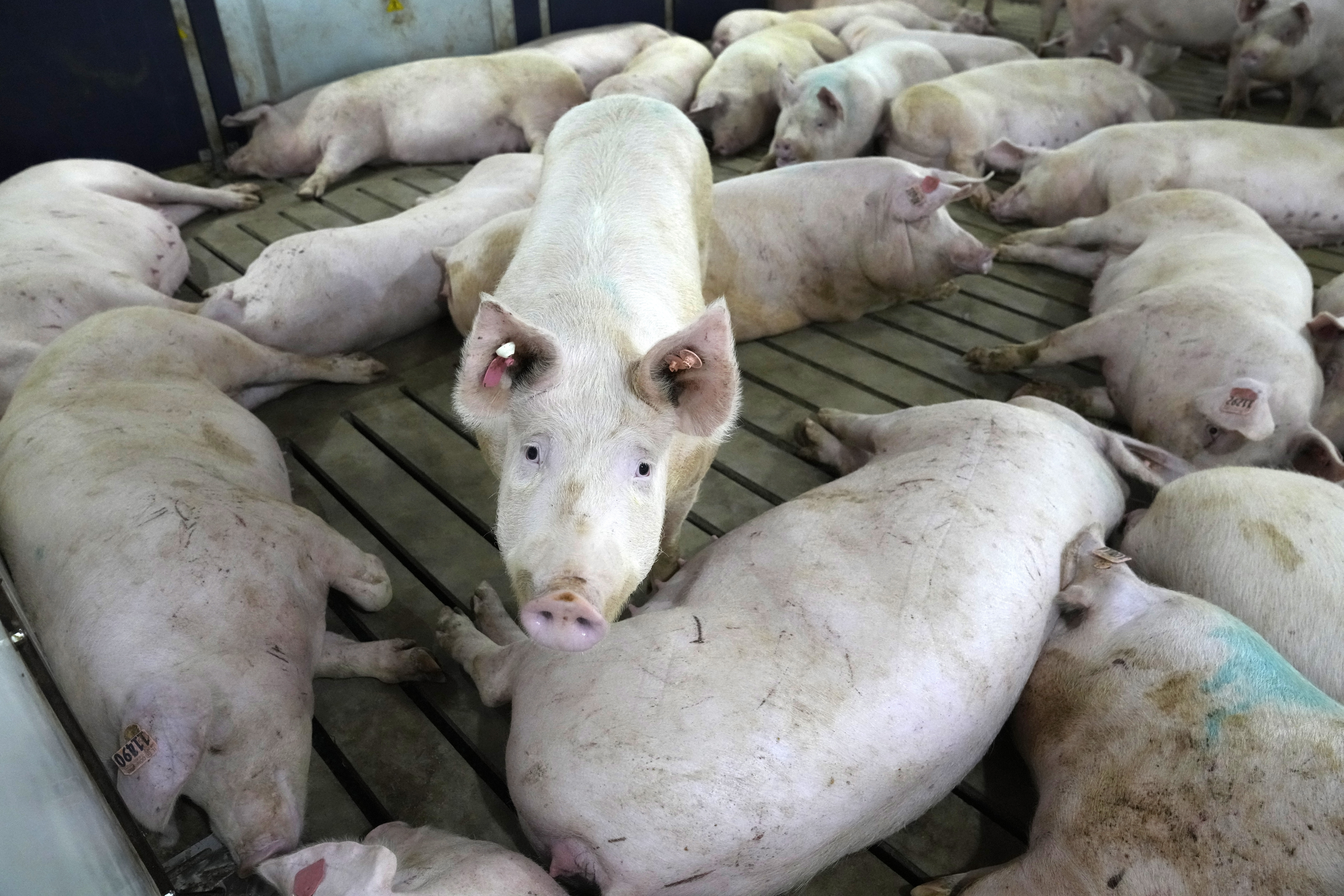A New Constitutional Crisis on the Horizon
A recent Supreme Court decision underscores the fragility of our system of government.


Gavin Newsom and Ron DeSantis are on the kind of collision course that the United States has been trying to avoid since the ratification of the Constitution — and the fallout could be dire for our system of government.
It starts with California’s Proposition 12, which requires out-of-state pig farmers to provide more space for mother pigs if they want to sell their raw pork in California. On the surface, this doesn’t seem like much of a controversy. Why shouldn’t Californians decide what types of products are sold in their state? And if out-of-state pork producers don’t like the rules, they can refuse to sell their pork in California. Or Congress can step in and have the last word.
But as the largest state economy in the country, California’s law will likely dictate production standards for pork sold across the entire United States. It may ensure more humane treatment for every pig, but it will also raise pork prices for every human.
The Supreme Court weighed in recently with a ruling that scrambled the typical ideological alliances. Justices Neil Gorsuch, Clarence Thomas, Sonia Sotomayor, Elena Kagan and Amy Coney Barrett voted together to uphold Proposition 12 because the law applied equally to in-state and out-of-state pork producers and these sorts of nondiscriminatory state laws should be upheld since Congress could pass a law setting a national standard at any point. Justices John Roberts, Samuel Alito, Brett Kavanaugh and Ketanji Brown Jackson were on the other side, arguing that the court should consider the broad economic effect this law — and others like it — will have on commerce between the states. Ultimately there were five separate opinions in support of the law, with various justices joining parts of each.
It’s a landmark case that offered the court its first opportunity to address a new type of political polarization, as ambitious governors from states like California and Florida increasingly seek to use the clout of their large, virtually single-party states to win plaudits from their partisan constituencies — with major consequences for the rest of us. The court’s decision means politics is only going to further infect our economic lives; it could even help unravel the delicate balance of federalism that’s central to American governance. Yet it’s hard to fault the court or even the governors. The justices are interpreting the law as they see it; the governors are responding to the natural political incentives. The real blame lies with an idle Congress that is supposed to referee these types of fights between states.
The court’s fractured majority didn’t answer how it would rule on the types of laws that are almost certainly coming next. As Kavanaugh raised in a separate opinion, if California can dictate how pigs are raised in Iowa, can “a state law prohibit the retail sale of goods from producers that do not pay for employees’ birth control or abortions (or alternatively, that do pay for employees’ birth control or abortions)?”
And, to be clear, this is a bipartisan show of force. In Florida, DeSantis signed a law prohibiting large social media companies from removing political candidates from their platforms, no matter what they say online. Like the pork law in California, this would leave companies with the choice of whether to pull out of a large economy like Florida or enforce these standards across the United States. Unlike California, it also implicates the First Amendment rights of the social media companies. The Supreme Court is currently deciding whether to hear this case next term.
In California, Newsom vowed to cut ties with Walgreens this spring because the company said it would stop providing the abortion drug mifepristone in 20 states, mostly where abortion was banned or restricted. Nothing Walgreens was doing in those states was going to affect California residents, but Newsom made clear he was eager to throw California’s weight around in order to push his team’s moral preferences. “California is on track to be the fourth largest economy in the world and we will leverage our market power to defend the right to choose,” he said in a statement at the time, though the state did continue some business with Walgreens.
We have historically relied on Congress to resolve these kinds of conflicts, to preempt a state law like Prop 12 with federal legislation. (And indeed, in its successful arguments before the Supreme Court, California pointed to proposed federal bills that would have superseded Prop 12 yet failed to get a vote as evidence that Congress has chosen not to intervene.) But Congress has stagnated, giving in to gridlock that has only emboldened presidents to rely more and more on executive power to provide quick — if fleeting — solutions during the biggest political fights. The compromise and bipartisanship required to pass legislation has become a political liability in primaries, and congressional candidates from both parties have had more incentive to leave issues unresolved and ripe for their campaign ads.
Without the fear of congressional intervention or pressure from weakened political parties, governors, particularly those with an eye on Pennsylvania Avenue, see opportunity.
State governments have traditionally been left to pursue the policies best suited to the economies and politics of their own constituents — whether on health care or criminal justice. In that sense, we should want Democratic and Republican states to experiment with their preferred animal welfare laws or social media restrictions. But we should also want states to limit their power to within their own borders. States as unchecked, regional hegemonies will eventually snuff out federalism.
For the American system of government to work, states need to act like states; Congress needs to act like Congress. It should be no surprise that those with national political ambitions will seize on the vacuum left by Capitol Hill to showcase their ideological commitments and try to make national policy changes through state law. These new maneuvers have been wildly effective for governors such as Newsom and DeSantis, and will no doubt be imitated by more and more states — yet they also point to a chaotic future, with business, travel and the flow of basic goods even more politicized and at the whims of leaders that only a small fraction of the public have any say over electing.
This dilemma ultimately goes back to a debate that’s foundational to the American experiment. During the fight over ratification in the 1780s, the “Anti-Federalists” campaigned against the Constitution, arguing that a large national government would be unable to tame the competing priorities and politics of diverse states. While the Federalists believed that the recently failed Articles of Confederation showed that only a strong national government could create long lasting economic prosperity for the fledgling country, the Anti-Federalists had a longer history on their side — such exercises in self-government with politically and economically distinct groups had always ended in tyranny or balkanization.
In the Anti-Federalist Papers, anonymous Brutus argued that “in a republic, the manners, sentiments, and interests of the people should be similar” — as was never the case in the United States. Under a single federal government of a large diverse country, he feared there would be “a constant clashing of opinions; and the representatives of one part will be continually striving against those of the other.” He imagined a government frozen in place, unable to promote the public good.
Brutus lost the debate. The Constitution was ratified. And that brings us back to the pigs.
Does the Supreme Court’s ruling for California mean we are heading down a path toward blue-state bacon and red-state pharmacies? Then again, the alternative would have been a major blow to state self-governance and the traditional role states have played as our so-called laboratories of democracy.
The fact that the court’s ruling didn’t come down along traditional ideological or institutional lines underscores just how challenging it will be to resolve these problems in the future. All the while, Congress does less, presidents do more and states will be pulling the Supreme Court into our most contentious political fights.
Or to put it another way, we may be about to find out whether the Anti-Federalists were right.












